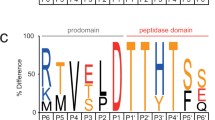Abstract.
A new system to study programmed cell death in plants is described. Tomato (Lycopersicon esculentum Mill.) suspension cells were induced to undergo programmed cell death by treatment with known inducers of apoptosis in mammalian cells. This chemical-induced cell death was accompanied by the characteristic features of apoptosis in animal cells, such as typical changes in nuclear morphology, the fragmentation of the nucleus and DNA fragmentation. In search of processes involved in plant apoptotic cell death, specific enzyme inhibitors were tested for cell-death-inhibiting activity. Our results showed that proteolysis plays a crucial role in apoptosis in plants. Furthermore, caspase-specific peptide inhibitors were found to be potent inhibitors of the chemical-induced cell death in tomato cells, indicating that, as in animal systems, caspase-like proteases are involved in the apoptotic cell death pathway in plants.
Similar content being viewed by others
Author information
Authors and Affiliations
Additional information
Received: 5 August 1999 / Accepted: 14 March 2000
Rights and permissions
About this article
Cite this article
De Jong, A., Hoeberichts, F., Yakimova, E. et al. Chemical-induced apoptotic cell death in tomato cells: involvement of caspase-like proteases. Planta 211, 656–662 (2000). https://doi.org/10.1007/s004250000341
Issue Date:
DOI: https://doi.org/10.1007/s004250000341




